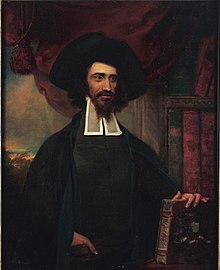Solomon Hirschell
Solomon Hirschell (* 1761 in London , † 31 October 1842 ibid; also Hirschel and Herschell ) was from 1802 to 1842 Chief Rabbi of Great Britain and Rabbi of the Great Synagogue of London. He became known for his unsuccessful attempt to stop the spread of Reform Judaism in his homeland by excommunicating its leaders.
His father was Hirschel Levin ( Hart Lyon ), a Polish Jew from Galicia , who was also the Grand Rabbi of London and Berlin and a friend of Moses Mendelssohn . His older brother was the Talmudist Saul Berlin . In 1765 his father left England with him after he had been appointed Rabbi of Halberstadt (and then of Berlin). Solomon Hirschell married at the age of seventeen and became Grand Rabbi of Prenzlau in Prussia in 1793 . In 1802 he finally succeeded David Tevele Schiff as Chief Rabbi of the German and Polish communities in London, after this position had been vacant for 11 years. Some of his sermons have been reprinted; for example one on the occasion of the death of Lord Nelson in 1805, which shows his simple faith and political loyalty. After his death, he was buried in the Jewish cemetery on Mile End Road in London on November 2, 1842 , during which time there were noteworthy expressions of respect.
The Jewish historian Cecil Roth, however, judges him less respectfully in his Encyclopedia Judaica :
“He was basically a European rabbi of the old type, with an imperfect knowledge of English and out of touch with the new currents beginning to permeate the community. He preached in Yiddish, opposed even mild reform, and his literary production was virtually nothing "
Web links
- Office of the Chief Rabbi: Past Chief Rabbis ( Memento from July 17, 2013 in the Internet Archive ) - Information on Solomon Hirschell (English)
Individual evidence
- ^ A b Solomon Hirschel - “High Priest of the Jews” OzTorah , accessed November 24, 2010
- ↑ a b American Libraries: Dictionary of national biography
| personal data | |
|---|---|
| SURNAME | Hirschell, Solomon |
| ALTERNATIVE NAMES | Hirschel, Solomon; Herschell, Solomon |
| BRIEF DESCRIPTION | Great Rabbi of Great Britain |
| DATE OF BIRTH | 1761 |
| PLACE OF BIRTH | London |
| DATE OF DEATH | October 31, 1842 |
| Place of death | London |
